News
Elisabete Martins
RSAI Newsletter (November 2021)
Dear RSAI members,
I hope this email finds you well.
I am pleased to write you to send you the newest issue of the RSAI Newsletter (download). This marks another step forward for our association. On the one hand, it lands on your desks while the first in-presence meeting of the North American Regional Science Council in two years is taking place in Denver, Colorado. Moreover, it is also the first issue of the newsletter co-edited by Mina Akhavan, whom the RSAI Council chose to join Martijn Smit in drafting this important vehicle of information for our members. Welcome Mina!
Enjoy the read, and please do not hesitate to get in touch with Martijn (This email address is being protected from spambots. You need JavaScript enabled to view it.) and Mina (This email address is being protected from spambots. You need JavaScript enabled to view it.) to propose new material for the newsletter.
Kind regards,
Winner of 2021 RSAI Dissertation Award
 Andreas Diemer is chosen as the winner of the RSAI dissertation award in 2021 for his work "Essays in the Spatial Economic Analysis of Social Interactions."
Andreas Diemer is chosen as the winner of the RSAI dissertation award in 2021 for his work "Essays in the Spatial Economic Analysis of Social Interactions."
The dissertation develops an interdisciplinary approach to identify the role of social networks in determining economic outcomes of both people and places, and discusses how social and geographical spaces interact to shape the fortunes of individuals and regions, using big data.
The committee found his dissertation to be novel and creative in the research framework, analysis and implications.
He received his Doctorate from London School of Economics, and was supervised by Professor Simona Iammarino and Prof. Michael Storper. Dr. Diemer is now at Swedish Institute for Social Research.
Congratulations!
Job Position | Assistant /Associate Professor: Environmental Economics, University of Illinois Urbana-Champaign, Department of Agricultural and Consumer Economics
Assistant /Associate Professor: Environmental Economics
University of Illinois Urbana-Champaign
Department of Agricultural and Consumer Economics
WE TRANSFORM LIVES. Everything we do is designed to improve the quality of life of the people in the state of Illinois, across the nation, and around the world. We discover, develop, translate, and disseminate knowledge to address societal concerns and train the next generation of experts and leaders in a way that empowers them to expand the boundaries of science to higher levels of understanding and influence.
Be a part of our story. The Department of Agricultural and Consumer Economics (ACE) is comprised of world-renowned faculty whose research and outreach programs influence national and international policymaking on issues ranging from how producers, consumers, and agribusinesses manage risk and adapt to climate change to the impacts of new technologies, environmental regulations, federal laws on profitability and human well-being.
The University of Illinois is an Equal Opportunity, Affirmative Action employer that recruits and hires qualified candidates without regard to race, color, religion, sex, sexual orientation, gender identity, age, national origin, disability or veteran status. For more information, visit http://go.illinois.edu/EEO.
The Department of Agricultural and Consumer Economics (ACE) seeks to fill a tenure-track position in Environmental Economics with a focus on the economics of climate change. The selected candidate will have a research program employing advanced quantitative methods to investigate issues related to climate change impacts, mitigation, and/or adaptation. The position will fill critical needs in graduate teaching and advising in environmental economics, in addition to teaching a course at the undergraduate level.
Responsibilities: The person filling this position will be expected to: (1) develop or maintain (depending on rank) a nationally-prominent research program with publications in leading peer-reviewed scientific journals, (2) contribute to the Department’s undergraduate and graduate teaching programs through teaching (generally two courses per year) and student advising, and (3) communicate research results to relevant policy makers and stakeholders.
ACE and the University of Illinois provide a rich collaborative research environment in climate change studies with the presence of research centers such as the Institute for Sustainability, Energy and Environment (ISEE), the Center for Climate, Regional, Environmental and Trade Economics (CREATE), the Center for the Economics of Sustainability (CEOS), the Center for Digital Agriculture (CDA), collaboration with departments such as Crop Sciences, Atmospheric Sciences, Natural Resources & Environmental Sciences, Civil and Environmental Engineering, and access to world-class computational resources through the National Center for Supercomputing Applications (NCSA).
Qualifications: All candidates must have a Ph.D. in agricultural/applied economics, economics or related field. Candidates at the Assistant Professor level should show potential for strong research and teaching programs in their area of specialization, and must have completed their degree before the start date of the appointment. Candidates at the Associate Professor level must have a record that shows real promise of becoming a leader in research, teaching, and service, with a high demonstrated likelihood of sustaining contributions to the field and to the department.
Salary and Appointment: Competitive, based on qualifications and rank, 9-month academic year, tenure track, 55% research / 45% teaching.
Start Date: The anticipated starting date for the position is August 16, 2022.
Application: To ensure full consideration, applications must be received by December 10, 2021, but applications will be accepted until a candidate for hire has been identified. Interviews may begin before the closing date; however, no offers will be extended until after the date. To apply, please create a candidate profile at http://jobs.illinois.edu and upload a brief cover letter, a CV, a sample of written work, a research statement, a teaching statement, a statement describing the candidate’s commitment to promoting diversity, equity and inclusion, and names/contact information for three references.
Additional Information: For additional information about the department, see https://ace.illinois.edu/. For additional information about the position, contact the search chair, Sandy Dall’erba at This email address is being protected from spambots. You need JavaScript enabled to view it..
University of Illinois faculty, staff and students are required to be fully vaccinated against COVID-19. If you are not able to receive the vaccine for medical or religious reasons, you may seek approval for an exemption in accordance with applicable University processes.
The University of Illinois conducts criminal background checks on all job candidates upon acceptance of a contingent offer. Convictions are not a bar to employment. The University of Illinois System requires candidates selected for hire to disclose any documented finding of sexual misconduct or sexual harassment and to authorize inquiries to current and former employers regarding findings of sexual misconduct or sexual harassment. For more information, visit Policy on Consideration of Sexual Misconduct in Prior Employment. As a qualifying federal contractor, the University of Illinois System uses E-Verify to verify employment eligibility.
Illinois welcomes individuals with diverse backgrounds, experiences, and ideas who embrace and value diversity and inclusivity. (https://diversity.illinois.edu/). Diversity, equity, inclusion, and belonging are core values at UIUC. Our excellence can only be fully realized by faculty, students, and academic and nonacademic staff who share our commitment to these values. Successful candidates for our academic positions will demonstrate evidence of a commitment to advancing diversity, equity and inclusion.
Apply for Position: https://jobs.illinois.edu/faculty-positions/job-details?jobID=155930&job=agricultural-consumer-economics-assistant-associate-professor-environmental-economics-155930
#ERSA2022 Call for Special Session Proposals is OPEN LINK
|
|
|
|
|
|
|
|
|
Call for papers | RSPP Special Session on Sustainable Development of Afghanistan at the 52nd conference of RSAIndia
52nd Regional Science Conference
on
Resurgence of Regions
To be held at
The Institute of Development Studies Kolkata (IDSK), Kolkata, West Bengal, India
Call for papers for the
RSPP Special Session on
Sustainable Development of Afghanistan
by
Abdul Shaban
Tata Institute of Social Sciences, Mumbai and
Rohina Zaffari
University of Kabul, Kabul
Human capital, democracy, peace, economic openness, and physical resources play determining role in the development of any country or region. Afghanistan, a country with about 39 million population, is endowed with enormous natural resources. The country is located on the crucial crossroad of China, India, Central Asia, and the Middle East. Notwithstanding its geopolitical significance and the rich mineral resources, the political and social instabilities have acted as barriers to the economic development of the country. The war over the years and conservative social practices have kept Afghanistan economically deprived. It is not surprising that today’s Afghanistan is one of the least developed countries of the world. Scarce data reveal that about 38% of the population of the country lived below the poverty line in 2010, and per capita income was only US $461 in 2020. Because of war and poverty, the net migration in 2020 was -315 thousand.
Given, the difficult political history and development situation, Afghanistan requires deeper analysis of its existing situation and human practices to learn and track itself on the path of sustainable development. The major challenge before the country is how to evolve a war-torn economy into a peaceful, prosperous, and sustainable economy?
This proposed special session will attempt to understand the possibilities of development of Afghanistan in the context the regional history and current realities, with the following major subareas (though not limited to),
- From war to peace, prospects for regional development in Afghanistan
- Regional philosophy of peace and development and spatial practices
- Economic structure and potentials of growth
- Inequality, poverty, and potential for sustainable community development
- The role of trade, especially the regional trade (India, Pakistan, China, Iran, and Central Asian Countries), and investment in development,
- Urban centres, regional growth (including rural-urban), and development
- Educational Institutions, skills, and human capital
- Women and development
- Sustainable Development Goals in the Regions of Afghanistan
Submission of abstract for the special session
For the special session, we invite an abstract of 250-500 words from prospective authors highlighting the research problem, data, methods, major findings, and policy suggestions. The last date of submission of the abstract is 25 November 2021. Author(s) of papers will be communicated about the suitability of their abstracts, with suggestions if any by 23th November 2021. This Special Session will be held online on 10th December 2021
The authors presenting paper in this special session will have an opportunity to submit their paper for special issue of the Journal Regional Science Policy & Practice. For details see,
https://regionalscience.org/index.php/news/journals/item/2872-rspp-call-for-papers- special-issue-on-sustainable-development-of-afghanistan.html
The abstract can be emailed to This email address is being protected from spambots. You need JavaScript enabled to view it. with copy (cc) to This email address is being protected from spambots. You need JavaScript enabled to view it.
Please mark in Subject Line “Abstract for RSPP Special Session”
The authors of the abstracts will be requested to register for the conference once their abstract is accepted.
https://forms.gle/DZs66yTYvDKyZYTT8
The conference will be held in online mode.
Indian Section | Nurturing Young Talent Workshop and Anual Conference, December 8-10, 2021
Nurturing Young Talent Workshop
supported by RSA International on COMPUTATIONAL SOCIAL SCIENCES
Will be held on DECEMBER 08, 2021 @ 09:00– 17:30 HRS (IST)
There is no registration fee.
Workshop link will be shared with all registered participants.
Applicants for the workshop kindly fill up the following form.
https://forms.gle/CwVSxELLrrkRwBtN9
registered delegates are also requested to submit this form to join the workshop
52nd Annual Conference of Regional Science Association, India | Resurgence of Regions
Co-hosted by Institute of Development Studies, Kolkata in Collaboration with Regional Science Policy and Practice
Important Dates
Abstract Submission: 22nd November 2021
Intimation about Abstract Acceptance: 25th November 2021
Registration: 28th November 2021
Events
RSAI NYT Workshop: 08th December 2021
Main Conference: 09th and 10th December 2021
Registration
To register for the conference kindly fill-up the following form: https://forms.gle/DZs66yTYvDKyZYTT8
Please pay the registration fees before filling up the registration form and uploading the payment receipt.
Registration Fees
Online Participants:
Members of RSA India: INR 800/-
Non-members: INR 1000/-
More information at: https://rsai.org.in/
Assoc. Dean for Diversity and Inclusion at Cornell’s Department of City and Regional Planning
Cornell’s Department of City and Regional Planning is hiring an Assoc. Dean for Diversity and Inclusion
https://jobs.acsp.org/job/aap-associate-dean-for-diversity-and-inclusion/58942593/
Two tenure track Assistant Professor (or early stage Associate Professor) at Cornell’s Department of City and Regional Planning
Cornell’s Department of City and Regional Planning is pleased to announce two tenure track Assistant Professor (or early stage Associate Professor) positions at Cornell. One position is part of a Cohort hire on Social Justice and Equity, and the other position is a collaboration with humanities to address Planning in the Digital Realm.
The full job descriptions are found at the links below.
- Social Justice and Equity - Cohort https://academicjobsonline.org/ajo/jobs/20244
- Planning and the Digital Realm - CIVIC https://academicjobsonline.org/ajo/jobs/20253
If a candidate wishes to be considered for both jobs, they must apply separately for each. Review of applications will begin on Nov 22, 2021.
Call for Papers | Workshop of NECTAR Cluster 4, Université Gustave Eiffel, Marne-la-Vallée, France, March 17-18 2022
Please find enclosed the call for papers to a workshop of NECTAR Cluster 4 which will be held at Université Gustave Eiffel, Marne-la-Vallée, France, March 17-18 2022. The workshop is about "Teleworking, commuting and the housing market in the post COVID19 era".
Also note that the meeting can be combined with an UERA Thematic Working Group on Accessibility that is planned the day before the event, March 16, on the quarter-hour city, also in Marne-la-Vallée.
The Annals of Regional Science, Volume 67, Issue 3 - New Issue Alert
|
|
||||
|
|
|||
|
|
|
|
|||
|
|
|
|||
|
|
|
|||
|
|
|
|||
|
|
|
|
|||
|
|
|
|||
|
|
|
|||
|
|
|
|
|||
|
|
|
|||
|
|
|
|||||
About Us
The Regional Science Association International (RSAI), founded in 1954, is an international community of scholars interested in the regional impacts of national or global processes of economic and social change.

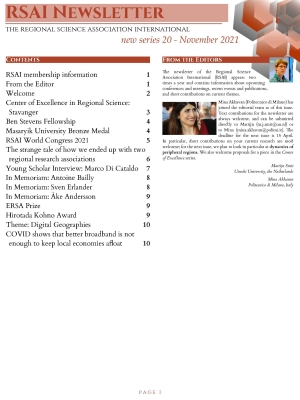

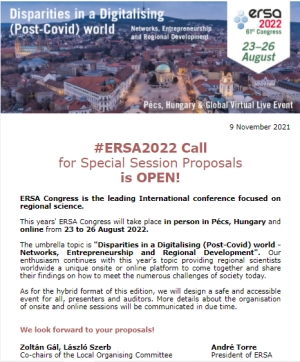


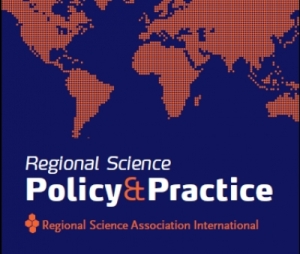


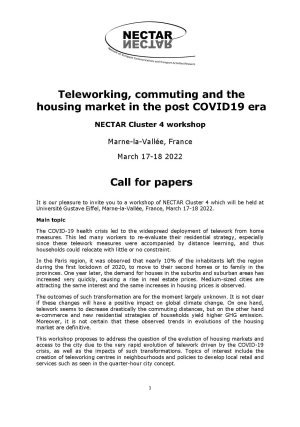
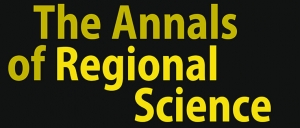
 The Annals of Regional Science.
The Annals of Regional Science.